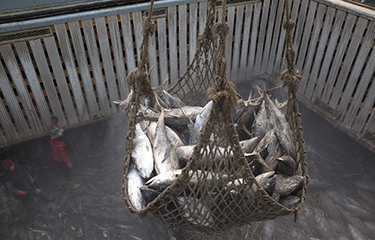A campaign to develop, publicize, and enforce guidelines setting standards for the responsible management of transferring catch between vessels at sea is gaining momentum.
The Food and Agriculture Organization is leading an effort to close loopholes allowing for transshipment of catch on the high seas, a practice the United Nations organization said encourages illegal, unreported, and unregulated (IUU) fishing.
Trygg Mat Tracking, Global Fishing Watch, the International Monitoring, Control, and Surveillance Network, and The Pew Charitable Trusts said in a report there is evidence some of the areas where transshipment of fresh fish takes place, especially at sea, “are inaccessible to fisheries inspectors that create gaps for unscrupulous operators to manipulate or otherwise omit data pertaining to their fishing practices and catches for financial gain.”
This lack of adequate monitoring and controls has bred conditions that could lead to an increase in IUU fishing and may facilitate the introduction of illegally sourced fish into the market, the report said.
The NGOs said they came to their conclusion following a review of a combination of satellite technology, machine learning, and public authorization data.
Moreover, the NGOs are concerned about the possibility of gaps in the enforcement of transshipment regulations, practices, and control mechanisms opening avenues for other “maritime crime such as trafficking of weapons, drugs, and even people.”
For example, the use of containers ferrying fresh catch like tuna, crab, squid, and small pelagic fish to ports for processing – rather than traditional refrigerated cargo vessels – has increased, even as reports find the practice is often inadequately managed.
The trend has become commonplace largely because each regional fisheries management organization (RFMOs) approaches regulating the containerization of fish caught at sea differently, the group of NGOs said.
“It is therefore important that containerization is reflected in the definitions and categorized as a landing —and that systematic risk assessments and inspections take place, as are required for other landing practices,” they said.
Meanwhile, a dearth of data and inaccurate reporting of catches persist in key fisheries globally, leading to what NGOs said is “skewed stock assessments that can impact conservation and management efforts across valuable fisheries.” That lack of data can also impede traceability efforts, as the illegally caught fish can be mixed in with legally caught fish, they said.
The FAO previously reviewed global transshipment regulations and control mechanisms and carried out studies on transshipment that shows gaps and inadequacies that encourage IUU fishing. During the 2016 FAO Committee on Fisheries’ (COFI) 32nd Session, participants encouraged the 183 members of the U.N. agency to commence “work on transshipment in the context of IUU fishing.”
A year after the committee’s appeal, FAO carried out a global analysis to establish how the transfer of fresh fish between vessels is conducted at sea. The review of transshipment regulations and practices suggested the practice be more rigorously monitored. It recommended a comprehensive study to support the development of guidelines on best practices in the regulation and control of transshipment, but that proposal was tabled at the 33rd COFI Session in 2018.
“As well as increasing the risk of IUU-caught fish entering the marketing chain and thereby undermining sustainable fisheries and ocean conservation, transshipment practices may also contribute to the overexploitation of fisheries resources and have negative effects on the socio-economic wellbeing of legitimate fishers and coastal communities, particularly in developing countries,” the FAO report said.
Trygg Mat Tracking, Global Fishing Watch, the International Monitoring, Control and Surveillance Network, and The Pew Charitable Trusts recommended in their report that voluntary transshipment guidelines be incorporated into FAO’s in-depth study findings, outlined in the U.N. agency’s report titled “Transshipment: A Closer Look.”
“We need leadership from those engaged in the development of the voluntary guidelines to ensure that transshipment activities can continue to serve as a vital component of fisheries operations, while preventing abuse by those seeking to profit at the expense of the fisheries and fishers that feed us,” the organizations said.
Photo courtesy of The Pew Charitable Trusts.







